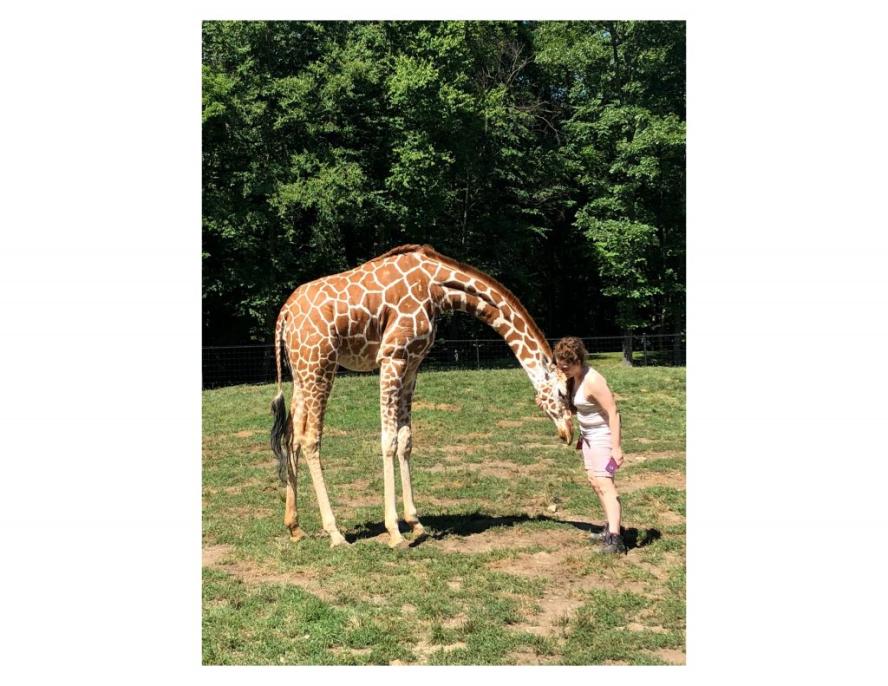-
About
- Leadership & Faculty
- News & Events
-
Academics
- Graduate
- Advanced Clinical Training
- Continuing Education
- Academic Departments
- Academic Offices
- Simulation Experiences
-
Student Life
- Offices
-
Research
-
Hospitals & Clinics
- Emergency Care
- Hospital Services
-
Community Outreach
- Volunteer

Ashley McCann

Education
B.S., Wildlife and Conservation Biology and B.S., Geology and Geological Oceanography, University of Rhode Island, 2013
M.S. in Animals and Public Policy, Tufts University, 2021
Biography
What were you doing before entering the Masters in Animals and Public Policy (MAPP) program?
My primary background is in zookeeping and veterinary medicine. Prior to entering the MAPP Program, I was employed as a veterinary assistant at Bull’s Head Pet Hospital in Stamford, CT. I developed a solid working knowledge of good veterinary medicine and a practical skill set with the guidance of a supportive and talented staff. Before joining the pet hospital team, I had the privilege of serving as the Lead Zookeeper of Hoofstock at the LEO Zoological Conservation Center in Connecticut. As a non-profit breeding center of endangered and exotic species, my job encompassed complete oversight of the care and welfare of our hoofstock animals, including giraffe, grevy’s zebra, African warthogs, red river hogs, Bactrian camels, and occasionally aardvarks! I had the pleasure of conversing with visiting student groups and zoo members, relaying the importance of wildlife conservation with a little help from my ungulate friends. My previous experience also includes emergency veterinary assisting and working with ambassador and education animals at the Bronx Zoo in New York.
What aspects of MAPP led to your decision to join the program?
Throughout my years in the veterinary and zoo realms, I’d developed a tangible passion for animal welfare. The guidelines for the daily safety, enrichment and care of zoo animals in AZA and ZAA accredited zoos are minutely specific, thorough, and under constant review. Training to be a zookeeper was very enlightening to the high level of care that zoo animals receive. As my interest in the subject grew, I was also distressed to learn about the lack of laws and protections for many captive animals in this country that are not in “good” zoos. The comprehensive, unbiased discussion of animal welfare and the ability to build myself up into a position where I can have a positive impact on animals in captivity with a MAPP degree are the primary reasons for joining this program.
Interests in and experience with animals
I grew up in an animal-loving household, practically raised by cats from the get-go. I have loved many cats and dogs in my life and have been working with animals in veterinary medicine or zoos for 14 years.
What do you want to focus on at MAPP? What drew you to this?
While enrolled in the MAPP program I plan on focusing on animals in captivity from a welfare perspective. I was drawn to this through my connections working with and caring for exotic animals, and I deeply want to improve the lives of unprotected animals through positive policy change in this country. At this time, my specific goal is to bring awareness and protections to exotics hunted for sport in certain states. Ideally, I would like to see Americans follow the ecotourism model, to be able to visit African “game ranches” without leaving the country and experience safari tours without the cruelty of canned hunting, or poorly kept exotic pets. I believe this can be reached by better understanding the way that different people value animals. For me, creating a bond of trust with a wild animal is far more exhilarating than taking their life could ever be. I hope to create a discussion to educate others on how to value the inner lives of animals, and encourage them to love, protect and respect the wildlife around them.
MAPP Externship
As a summer extern with Providence Animal Rescue League in Rhode Island, I focused on community support programs and shelter medicine. I became familiar with the complex challenges of fundraising, acquiring donations and organizing business partnerships, as well as safely serving the public during a pandemic. I also worked with the animal care teams socializing and caring for our cats and dogs.
I directly applied written and oral communication skills from …